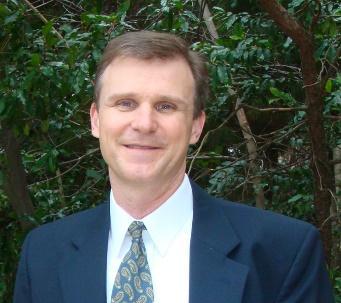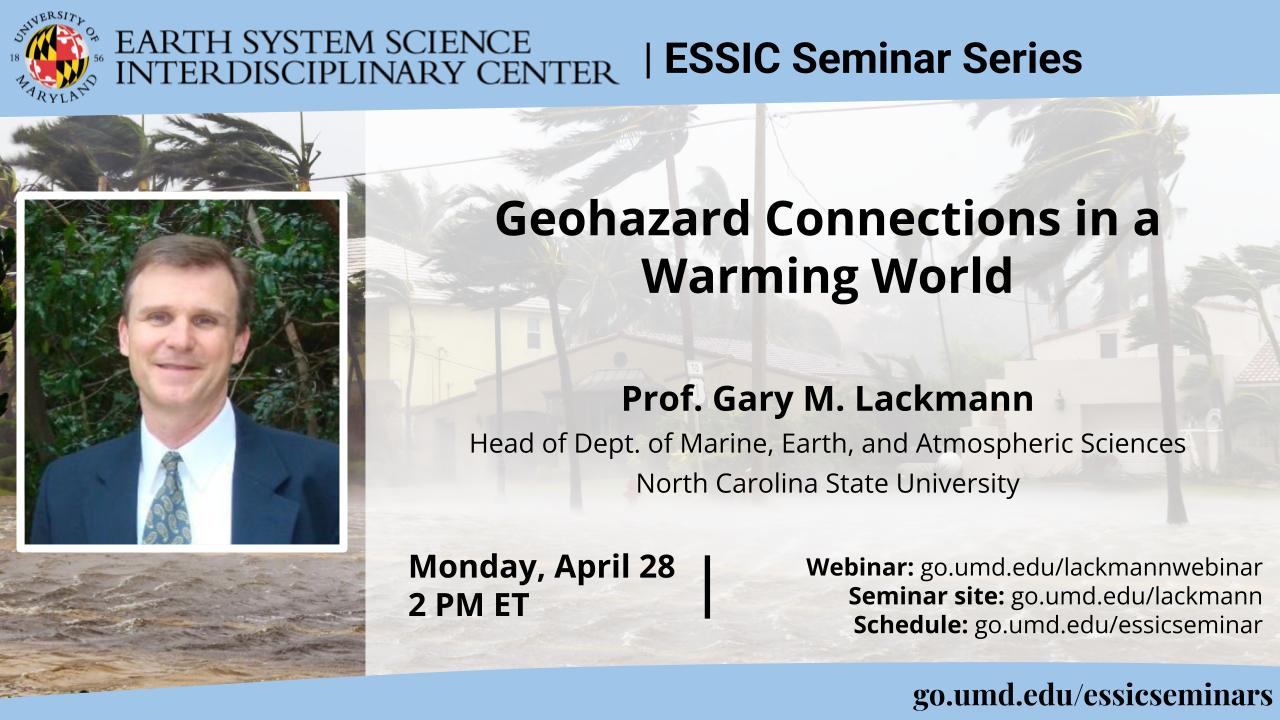
Geohazard Connections in a Warming World
Prof. Gary M. Lackmann
Head of Dept. of Marine, Earth, and Atmospheric Sciences
North Carolina State University
Monday April 28, 2025, 2 PM ET
Abstract:
Extreme weather events can be associated with substantial societal impacts, and these events are increasing as the planet warms. Some extreme weather events are associated with a “cascade” of connected geohazards involving different components of the Earth system. What are the physical mechanisms at work in connecting a sequence of extreme events, and how do they respond to warming? In this talk I will discuss some recent cascading geohazard events, focusing on Hurricane Helene (2024) and the June 2021 Western North American heatwave. I will explore a physical process that can connect events in these sequences, and explore how these connections can amplify in a warming climate. Hurricane Helene and associated meteorological, hydrological, and geological extremes can be associated with ongoing large-scale oceanic extremes. The Western North American heat wave can also be linked to anomalous upstream ocean warmth via diabatic processes. I will present an analysis of the physical processes contributing to record near-surface warmth and investigate the role of an upstream atmospheric river in the heatwave using numerical model experiments. We find that a “Chinook” or “Foehn” type flow contributed substantially to the warmth, and that an upstream atmospheric river was strongly connected with heatwave intensity. This type of heat event results in part from diabatic amplification associated with the condensation of water vapor, which helps to explain the increasing frequency of “black swan” events. The nonlinear increase of atmospheric water vapor with temperature suggests that an important connective mechanism in extreme weather will amplify with warming. Finally, what are the opportunities to prepare and mitigate for increasingly frequent, cascading geohazards and explore coupled prediction capabilities?
Biosketch:
Dr. Gary Lackmann is a professor in the Department of Marine, Earth, and Atmospheric Sciences at North Carolina State University. His research group focuses on the processes and predictability of high-impact synoptic, mesoscale, and tropical weather systems, and how these systems are affected by climate change. He teaches synoptic meteorology and numerical weather prediction and authored a textbook covering these topics. Gary has held the administrative role of Department Head since August 2023.
After earning B.S. and M.S. degrees from the University of Washington, Gary completed a Ph.D. at the State University of New York, University at Albany. His professional appointments include research scientist positions at NOAA/Pacific Marine Environmental Laboratory and the Naval Postgraduate School. Gary held a postdoctoral position at McGill University and a faculty position at SUNY College at Brockport before joining the faculty of North Carolina State University in 1999.
Gary was honored to receive the American Meteorological Society (AMS) 2014 Edward N. Lorenz Teaching Excellence Award, the North Carolina State University Outstanding Teacher Award (2012-2013), The Alumni Association Outstanding Teacher Award (2012-2013), and the LeRoy and Elva Martin Award for Teaching Excellence (2004). He earned the 2003 AMS Editors Award for Monthly Weather Review, a 2003 NOAA Collaborative Research Award, and the T. Theodore Fujita Research Achievement Award in 2015. From 2017 to 2023, Gary served as Editor-in-Chief of the journal Weather and Forecasting. He was elected Fellow of the AMS in 2019 and was an elected member of the AMS Council from 2018 to 2020.
Webinar:
Event site: https://go.umd.edu/lackmann
Zoom Webinar: https://go.umd.edu/lackmannwebinar
Zoom Meeting ID: 999 6858 0549
Zoom password: essic
US Toll: +13017158592
Global call-in numbers: https://umd.zoom.us/u/aMElEpvNu
For IT assistance:
Cazzy Medley: cazzy@umd.edu
Resources:
Seminar schedule & archive: https://go.umd.edu/essicseminar
Seminar Google calendar: https://go.umd.edu/essicseminarcalendar
Seminar recordings on Youtube: https://www.youtube.com/user/ESSICUMD

